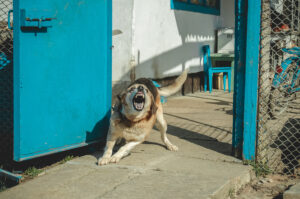Dog attacks and bites can result in severe physical and emotional trauma, leaving victims with long-lasting injuries. To protect citizens and maintain public safety, states have enacted laws and regulations regarding dangerous dogs. In South Carolina, there are specific guidelines that determine what constitutes a dangerous dog. This article will explore those requirements and provide valuable information for residents of South Carolina to understand the implications and precautions associated with dangerous dogs.
Defining a Dangerous Dog
In South Carolina, a dog is considered dangerous if it inflicts or causes severe injury or death to a person without being provoked while off its owner’s property. Additionally, a dog can also be designated as dangerous if it has a documented history of attacking or biting people, domestic animals, or pets without provocation.
Requirements for Dangerous Dog Classification
South Carolina has specific requirements that must be met for a dog to be legally classified as dangerous. These requirements include:
Unprovoked Attacks: A dog must exhibit aggressive behavior resulting in an unprovoked attack that causes severe injury or death to a person. It is crucial to note that the absence of provocation is a crucial factor in determining the dangerous status of the dog.
Attacks on Domestic Animals: A dog may be classified as dangerous if it has previously attacked or killed a domestic animal without provocation while off its owner’s property.
Prior Attacks on People: If a dog has attacked or bitten a person without provocation, resulting in injury or death, it may be deemed dangerous. The history of aggressive behavior towards humans is a strong indication of the dog’s potential danger.
Restrictions for Owners: Once a dog is classified as dangerous, the owner must adhere to certain restrictions. These restrictions include securely confining the dog indoors or in a secure enclosure and keeping the dog on a leash and muzzled while outside the owner’s property. The owner is also required to display visible signage indicating the presence of a dangerous dog on their premises.
Legal Consequences
When a dog is designated as dangerous in South Carolina, the owner assumes responsibility for the pet’s actions. If a dangerous dog attacks or bites someone, the owner may face legal consequences, including criminal charges and civil liability for any injuries or damages caused by the dog.
The legal consequences for the owner may include fines, mandatory attendance at dog training or obedience classes, and even the possibility of the dog being euthanized. Moreover, the owner’s liability extends beyond medical expenses, as they may also be responsible for compensation for pain and suffering, emotional distress, and other damages suffered by the victim.
Protecting Yourself from Dangerous Dogs
To protect yourself and your loved ones from potential dog attacks, it is essential to be aware of your surroundings and take appropriate precautions. Some tips to consider include:
Approach dogs cautiously: Always approach unfamiliar dogs with caution, and never disturb a dog that is eating, sleeping, or caring for puppies.
Teach children about dog safety: Educate children about proper behavior around dogs, including not approaching strange dogs without the owner’s permission and avoiding sudden movements or loud noises that may startle a dog.
Be aware of leash laws: Familiarize yourself with local leash laws and ensure your own pets are properly restrained when in public.
Report dangerous dog behavior: If you witness a dog exhibiting aggressive or dangerous behavior, report it to local animal control or law enforcement authorities.
What is the Statute of Limitations?
The statute of limitations is a legal rule that sets the amount of time someone has to file a lawsuit after an incident occurs. In the case of dog bites, the statute of limitations determines how long you have to sue the dog owner for the injuries caused by their pet. If you don’t file your lawsuit within this time frame, you could be forever barred from taking legal action. This means you could miss out on receiving compensation for medical expenses, lost wages, and pain and suffering.
The purpose of the statute of limitations is to ensure that cases are filed while evidence is still fresh and witnesses can accurately recall the event. The law recognizes that as time passes, it becomes harder to prove what really happened. Memories fade, and physical evidence may no longer be available. By setting a deadline for filing, the law encourages people to act promptly and responsibly after an injury.
How Long is the Statute of Limitations for Dog Bites?
The length of the statute of limitations for dog bite cases varies depending on the state where the incident occurred. In most states, the statute of limitations for personal injury claims, including dog bites, is typically two or three years. However, this can change based on local laws, and in some cases, the time frame may be shorter or longer.
It’s crucial to know the specific statute of limitations in your state so that you don’t miss your window to file a lawsuit. If you’re unsure of the laws in your area, it’s important to consult with an attorney who is familiar with dog bite cases. They can help you understand the rules that apply to your case and ensure that you don’t run out of time to take legal action.
What Happens if You Miss the Deadline?
If you fail to file your dog bite lawsuit within the statute of limitations, the court will likely dismiss your case. This means that you will no longer be able to seek compensation for your injuries through the legal system. Even if you have a strong case and clear evidence, the court will not consider your claim if it is filed after the deadline has passed.
This can be a devastating outcome for victims who were unaware of the statute of limitations or who hesitated to take legal action. It’s important to remember that once the deadline has passed, there are very few exceptions that will allow you to proceed with your case. In most instances, missing the statute of limitations means losing your right to sue altogether.
Exceptions to the Statute of Limitations
While the statute of limitations is usually firm, there are some exceptions that can extend or pause the time frame in certain situations. One common exception is for minors. If the victim of the dog bite is a child, the statute of limitations may not begin until the child reaches a certain age, typically 18. This means that even if the bite occurred when the child was very young, they may still have the opportunity to file a lawsuit once they become an adult.
Another exception may apply if the person responsible for the injury tries to hide their role in the incident. If the dog owner purposely conceals information or tries to prevent the victim from learning about their rights, the statute of limitations may be extended to account for this. However, these exceptions are rare, and it’s always best to act as quickly as possible after an injury to avoid relying on any special circumstances.
Why You Shouldn’t Wait to File
Even if the statute of limitations in your state allows for a few years to file a dog bite lawsuit, it’s never a good idea to wait until the last minute. The sooner you begin the legal process, the better your chances of building a strong case. Over time, important evidence may be lost, and it could become more difficult to track down witnesses or medical records.
Filing promptly also gives you more time to recover from your injuries and fully understand the long-term impact of the dog bite. In some cases, complications from a bite may not become apparent until months or even years later. By starting the legal process early, you can ensure that all of your damages, including future medical needs, are taken into account when seeking compensation.
Acting quickly also allows your attorney to gather evidence while it is still fresh. Photographs of your injuries, medical reports, and witness statements are all important pieces of evidence that can strengthen your case. If you wait too long, this evidence may no longer be available or may be harder to obtain, making it more challenging to prove your claim.
South Carolina Dog Bite Liability and Homeowners Insurance
Dog bites can cause severe physical and emotional trauma, resulting in medical expenses, lost wages, and long-term consequences. In South Carolina, like many other states, dog owners are held responsible for injuries caused by their pets. To ensure protection against dog bite liabilities, homeowners insurance plays a crucial role. This article aims to shed light on South Carolina’s dog bite liability laws and the requirements for homeowners insurance coverage, empowering residents with essential knowledge and providing guidance on obtaining the appropriate coverage.
South Carolina Dog Bite Liability Laws
In South Carolina, dog bite liability is governed by the “statutory strict liability” rule. This rule imposes legal responsibility on dog owners for injuries inflicted by their dogs, regardless of the dog’s past behavior or the owner’s knowledge of its aggressive tendencies. Unlike some states that follow the “one-bite rule” requiring prior knowledge of a dog’s dangerous behavior, South Carolina holds owners liable for the first bite itself.
The statute also applies to injuries caused by a dog’s actions other than biting, such as knocking someone down or scratching. If a person suffers an injury due to a dog’s behavior, the owner may be held accountable for the damages incurred.
Homeowners Insurance and Dog Bite Coverage
For South Carolina homeowners, having adequate homeowners insurance is crucial to protect against potential dog bite liabilities. Standard homeowners insurance policies typically include liability coverage, which offers financial protection if you or your dog injures someone or damages their property.
However, it’s essential to review your policy carefully to understand the coverage provided for dog-related incidents. Some homeowners insurance policies may exclude coverage for certain breeds known for aggressive behavior or impose specific conditions and restrictions. Additionally, coverage limits may vary, so it’s crucial to ensure that your policy provides sufficient protection.
Requirements for Homeowners Insurance Coverage
To comply with homeowners insurance requirements in South Carolina regarding dog bite liability, consider the following factors:
- Disclosure: When applying for homeowners insurance or renewing an existing policy, it is vital to disclose the presence of a dog on your property. Failing to disclose this information could result in a denied claim if a dog-related incident occurs.
- Breed Restrictions: Certain insurance companies may impose restrictions on coverage based on the breed of your dog. Some breeds known for their aggressive tendencies, such as Pit Bulls, Rottweilers, and German Shepherds, may be subject to exclusions or limitations. Check with your insurance provider to understand any breed-specific restrictions.
- Liability Limits: Review your policy to ensure that the liability limits are sufficient to cover potential damages in the event of a dog-related incident. Adequate coverage can protect you from personal financial responsibility in case of a lawsuit.
- Additional Umbrella Coverage: Consider obtaining an umbrella policy that provides extra liability coverage beyond the limits of your homeowners’ insurance policy. This additional coverage can offer added protection against dog bite liabilities and other unforeseen circumstances.
Taking Action: Securing Appropriate Coverage
To ensure you are adequately protected against dog bite liabilities in South Carolina, take the following steps:
Review your homeowner’s insurance policy: Carefully examine your current policy to understand the coverage it provides for dog-related incidents, including any breed-specific restrictions or coverage limitations.
- Compare insurance providers: Shop around and obtain quotes from multiple insurance companies that offer homeowners insurance in South Carolina. Compare coverage options, policy limits, and any breed-specific restrictions to find the best fit for your needs.
- Consult an insurance agent: Reach out to an experienced insurance agent who can guide you through the process of selecting the right homeowner’s insurance policy. They can help you understand the specifics of the coverage and answer any questions you may have.
- Update your policy: Once you have chosen the insurance provider that suits your requirements, update your homeowners insurance policy accordingly, ensuring that it adequately covers dog bite liabilities.
Understanding the Claims Process
In the unfortunate event of a dog bite or dog-related incident, it’s crucial to understand the claims process to ensure a smooth resolution. If someone sustains injuries on your property due to your dog’s actions, promptly report the incident to your homeowner’s insurance company. Provide them with all the necessary details, including information about the injured party, medical treatment received, and any eyewitness accounts.
Your insurance company will initiate an investigation into the incident. They may request additional information, such as veterinary records or documentation of your dog’s training or behavior history. It’s important to cooperate fully with their requests and provide accurate and complete information.
During the claims process, your insurance company will evaluate the circumstances surrounding the incident, assess liability, and determine the appropriate compensation. If the injured party files a lawsuit against you, your homeowner’s insurance will also provide legal representation and cover legal expenses up to the policy limits.







Preventing Dog-Related Incidents
While having homeowners insurance coverage is vital, preventing dog-related incidents altogether is even better. Responsible dog ownership includes taking proactive measures to minimize the risk of dog bites and injuries. Here are some essential tips:
- Socialization and Training: Socialize your dog from an early age, exposing them to various people, animals, and environments. Enroll them in obedience training classes to teach them proper behavior and commands.
- Supervision: Never leave your dog unsupervised with unfamiliar individuals, especially children. Supervision is crucial, even if your dog is friendly and well-behaved.
- Secure Fencing: Ensure that your property has a secure and sturdy fence to prevent your dog from escaping and potentially causing harm to others.
- Spay/Neuter: Consider spaying or neutering your dog, as this can reduce their aggression and territorial behavior.
How to Report a Dog Bite in South Carolina: Step-by-Step Guide
Dog bites can be a distressing experience, causing physical and emotional trauma. If you or someone you know has been bitten by a dog in South Carolina, it’s crucial to take the appropriate steps to ensure your safety and hold the responsible parties accountable. This step-by-step guide will help you navigate the process of reporting a dog bite in South Carolina and seek the necessary legal recourse.
Step 1: Seek Medical Attention
The first and most crucial step after a dog bite is to seek immediate medical attention. Dog bites can lead to serious injuries and infections, so it’s essential to have your wounds evaluated by a medical professional. Even if the bite seems minor, it’s always better to err on the side of caution.
Step 2: Gather Information
Once you have received the necessary medical care, gather as much information as possible about the incident. This includes identifying the dog and its owner, if possible. Take note of the dog’s breed, size, color, and any distinct markings. Collect contact details of any witnesses who saw the incident, as their statements may be valuable in supporting your case.
Step 3: Report the Dog Bite
To report a dog bite in South Carolina, you should contact the local authorities or animal control agency in the county where the incident occurred. Provide them with all the relevant details, including a description of the incident, the dog involved, and any information you have about the owner. It’s important to report the incident promptly, as delays may hinder the investigation.
Step 4: File a Report with Law Enforcement
In addition to reporting the dog bite to the local animal control agency, it’s advisable to file a report with your local law enforcement agency. This step ensures that the incident is properly documented and creates an official record of the incident. Provide the law enforcement agency with all the details you have gathered, and they will guide you on the necessary procedures.
Step 5: Consult with an Attorney
After reporting the dog bite to the authorities, it’s crucial to consult with a personal injury attorney who focuses on dog bite cases. They will provide you with legal guidance, evaluate the circumstances surrounding the incident, and help you understand your rights and options. An experienced attorney will navigate the legal process on your behalf and advocate for fair compensation for your injuries.
Step 6: Follow-up and Document Your Injuries
Throughout your recovery process, make sure to follow all medical instructions and attend any necessary appointments. Document your injuries by taking photographs regularly to capture the progression of your wounds. This documentation will serve as evidence to support your case and can be valuable in establishing the extent of your injuries and the associated damages.
Step 7: Pursue Legal Action, if Necessary
If the dog bite incident has caused significant physical, emotional, or financial harm, you may choose to pursue legal action. Your attorney will guide you through the process, including filing a personal injury claim against the dog owner. They will work to gather evidence, negotiate with insurance companies, and represent your best interests in court, if required.
Step 8: Understand South Carolina’s Dog Bite Laws
It’s important to familiarize yourself with South Carolina’s dog bite laws to understand your rights and the legal implications surrounding dog bite incidents. In South Carolina, dog owners can be held liable for injuries caused by their dogs under certain circumstances. The state follows a “strict liability” rule, meaning that dog owners can be held responsible for injuries caused by their dogs regardless of whether the owner knew or should have known about the dog’s dangerous tendencies.
Step 9: Cooperate with Investigations
During the investigation process, it’s crucial to cooperate fully with the authorities and your attorney. Provide them with any additional information or evidence they may request, such as medical records, photographs, or witness statements. This cooperation will strengthen your case and help ensure a thorough examination of the incident.
Step 10: Seek Compensation for Damages
If you have suffered injuries and damages as a result of a dog bite, you may be entitled to compensation. Damages can include medical expenses, lost wages, pain and suffering, and emotional distress. Work closely with your attorney to assess the full extent of your damages and build a strong case for fair compensation.
Step 11: Be Prepared for Settlement Negotiations or Trial
Once you and your attorney have gathered all the necessary evidence and assessed your damages, you may enter into settlement negotiations with the dog owner’s insurance company or proceed to trial if a fair settlement cannot be reached. Your attorney will guide you through these stages, providing you with legal advice and representing your best interests throughout the process.
Step 12: Focus on Your Recovery
While pursuing legal action is important, it’s equally important to prioritize your recovery and well-being. Follow your healthcare provider’s instructions, attend any necessary therapy or rehabilitation sessions, and focus on your physical and emotional healing. Your attorney will handle the legal aspects of your case, allowing you to concentrate on getting back to a healthy and normal life.
Remember, every dog bite case is unique, and the legal process can vary based on the specific circumstances. This guide provides a general overview, but it’s always advisable to consult with a knowledgeable attorney who can provide personalized advice tailored to your situation.
Related Videos
Choosing a Personal Injury Attorney
How Much Is My Personal Injury Claim Worth?
Understanding Provocation in Dog Bite Cases in Georgia: A Legal Perspective
Dog bites can result in severe physical and emotional trauma for victims, and when such incidents occur, legal recourse becomes essential. In the state of Georgia, like in many other jurisdictions, the concept of provocation plays a crucial role in determining liability in dog bite cases. Understanding what constitutes provocation is essential for both dog owners and those who may find themselves victims of a canine attack.
Defining Provocation
In Georgia, provocation in the context of dog bite cases refers to behavior by the victim that incites or excites the dog to the point where it reacts aggressively. The key element is that the dog perceives a threat, leading to its defensive or aggressive response. However, not all interactions with a dog that result in a bite are considered provocation under the law.
What Constitutes Provocation
Physical Aggression or Threatening Gestures
One of the most straightforward forms of provocation is physical aggression or threatening gestures towards the dog. If an individual engages in actions that make a dog feel cornered or in danger, the dog may bite in self-defense.
Invasive Behavior
Dogs have personal space, and invading this space without proper caution can be seen as provocation. Sudden and intrusive actions, such as attempting to take food from a dog or grabbing at it without warning, can trigger defensive behavior.
Trespassing
If a person is on the dog owner’s property without permission or engages in behavior that the dog perceives as a threat to its territory, the resulting bite may be considered provoked.
Teasing or Harassment
Deliberately teasing, taunting, or harassing a dog may be viewed as provocation. This can include actions such as pulling on the dog’s ears or tail, making loud and sudden noises, or otherwise causing the animal distress.
Failure to Heed Warning Signs
If a dog exhibits signs of discomfort, fear, or aggression, and the person fails to respect these warning signals, any subsequent bite may be considered provoked. Ignoring a dog’s signals may be seen as contributing to the escalation of the situation.
The One-Bite Rule
Georgia follows the one-bite rule, which means that a dog owner may not be held strictly liable for the first bite or attack by their dog. However, if the owner was aware of the dog’s aggressive tendencies or had reason to believe the dog might pose a threat, they could still be held liable.
Dog bite cases in Georgia require a careful examination of the circumstances, with a particular focus on whether the victim’s actions constituted provocation. It is essential for both dog owners and those who may be exposed to unfamiliar dogs to be aware of the factors that can contribute to a dog bite being deemed provoked. Seeking legal advice in the event of a dog bite is crucial to navigate the complexities of liability and ensure a fair resolution for all parties involved.
If you or a loved one has been injured by a dangerous dog in South Carolina, it is crucial to seek legal guidance. The experienced personal injury attorneys at Malchow Johnson Injury Lawyers are here to help. Our dedicated team will fight to protect your rights and pursue fair compensation for your injuries. Contact us today for a free consultation to discuss your case and learn more about your legal options.
Understanding what constitutes a dangerous dog in South Carolina is vital for residents to ensure their safety and the safety of others. By recognizing the requirements for classifying a dog as dangerous and taking appropriate precautions, individuals can reduce the risk of dog attacks. If you have been a victim of a dangerous dog attack, it is crucial to seek legal counsel to protect your rights and pursue the compensation you deserve. Remember, the team at Malchow Johnson Injury Lawyers is ready to assist you.
Client Testimonials
Construction Accident Client Testimonial
Workers' Comp Client Testimonial






